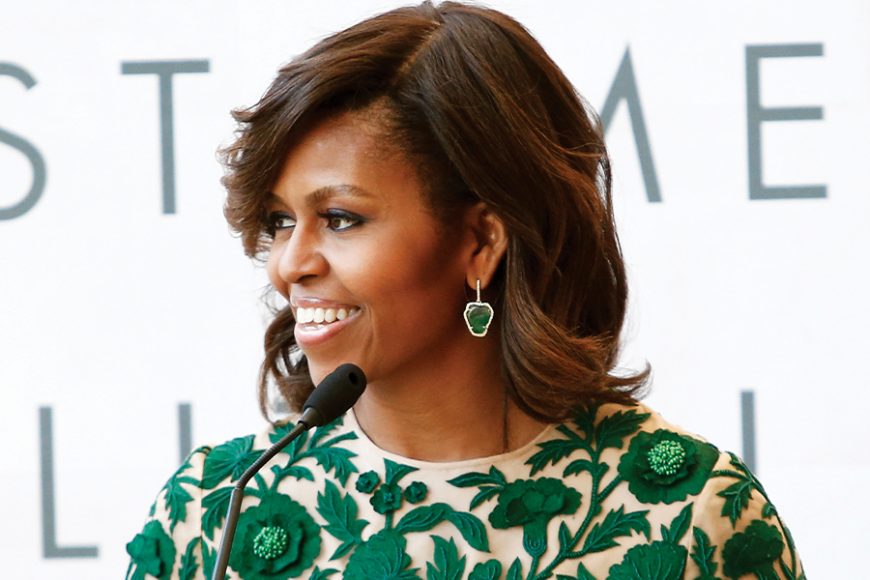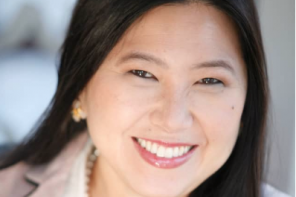On Oct. 13, 2016, first lady Michelle Obama took the stage of Southern New Hampshire University to support a former first lady, Hillary Clinton, in her bid to become the first woman president of the United States.
Obama looked terrific in a fitted blue outfit, so together. But she didn’t feel together. Obama has never been afraid to share what she’s thinking and feeling, and now she spoke from her shaken core to let everyone know it amid revelations of candidate Donald Trump’s infamous “Access Hollywood” tape — in which he suggested that it was OK to grab women by the privates, because hey, when you’re famous, they let you do that kind of stuff.
Her voice throbbing with the hurt and pent-up rage of the blood memories of women who’ve been violated, Obama described “that feeling of terror and violation that too many women have felt when someone has grabbed them, or forced himself on them and they’ve said no but he didn’t listen — something that we know happens on college campuses and countless other places every single day. It reminds us of stories we heard from our mothers and grandmothers about how, back in their day, the boss could say and do whatever he pleased to the women in the office and, even though they worked so hard, jumped over every hurdle to prove themselves, it was never enough.”
She added: “This is not normal. This is not politics as usual. This is disgraceful. It is intolerable. And it doesn’t matter what party you belong to — Democrat, Republican, independent — no woman deserves to be treated this way. None of us deserves this kind of abuse.”
That speech — along with the passion and courage Obama brought to it — galvanized the audience and electrified the country. As national affairs correspondent John Nichols wrote in the conservative publication The Nation: “Michelle Obama spoke a truth that must be recognized, and embraced, by everyone who cherishes the American experiment.”
Like her husband, Obama is a gifted speaker and storyteller. Her memoir, “Becoming,” sold enough copies in the first 15 days of its November publication last year to become the bestselling American book for all of 2018. With more than 10 million copies sold, “Becoming” is on pace to be the best-selling American memoir to date.
Her post-White House ventures have not been limited to the page. Together with her husband she has formed Higher Ground Productions, which has a content deal with Netflix. The aptly named Higher Ground — which evokes the Michelle maxim, “When they go low, we go high” — has announced seven projects in various stages of development that reflect the range of the producers’ interests. The first, “American Factory,” a documentary shown at the Sundance Film Festival, explores the cultural clash between a factory’s Chinese billionaire owner and some 2,000 blue-collar employees. “Crip Camp” — another Higher Ground-Netflix acquisition — is being made at the Sundance Institute. It tells the story of a rundown camp for disabled teens that spurred the disabilities movement in the 1970s.
Also in the works is a nonfiction series based on Michael Lewis’ book “Fifth Risk,” which considers Trump’s effect on government agencies; “Bloom,” a period drama about women and people of color in post-World War II New York; “Overlooked,” an anthology series about people whose deaths were not originally noted in The New York Times’ famed obituary column; and a feature film of David W. Blight’s Pulitzer Prize-winning biography, “Frederick Douglass: Prophet of Freedom.”
Fans of Obama will not be surprised to learn that rounding out the lucky seven is the preschool series “Listen to Your Vegetables & Eat Your Parents” — about the origin stories of various foods — that reflects the Let’s Move campaign Obama launched as first lady.
“We love this slate,” she said at the time of the announcement, “because it spans so many different interests and experiences, yet it’s all woven together with stories that are relevant to our daily lives.”
Few lives have resonated more in recent years than that of Obama herself — the first African-American first lady, descended from slaves on both sides of her multiracial family. Much has already been written about Obama’s solid upbringing on Chicago’s South Side; her success at Princeton University and Harvard Law School, decrying the naysayers; her work for nonprofits and in academic administration at the University of Chicago; and her mentoring of a certain charismatic summer associate at the law firm Sidley Austin L.L.P., where they both worked — Barack Obama.
First ladies, however admired, are often damned if they do and damned if they don’t. Obama was criticized as too fashionable, edgy and opinionated on the one hand and too conservative — with her establishment of the White House Kitchen Garden as part of Let’s Move and support for military families — on the other. But she charted her own course, mixing off the rack with haute couture, a little bit J. Crew, a little bit Jason Wu, whom she put on the map by wearing one of his gowns to each of her husband’s two inaugural balls.
Taking another page from Jacqueline Kennedy Onassis, who said, “If you bungle raising your children, I don’t think whatever else you do well matters very much,” Obama made sure that daughters Malia and Natasha (Sasha) were nurtured and protected in the White House, drawing on the quiet strength of her mother, Marian Shields Robinson, a homemaker turned Spiegel catalog secretary who moved into 1600 Pennsylvania Ave. (Obama’s equally adored father, Fraser Robinson III, a Chicago water plant employee and Democratic Party precinct captain, died in 1991 of complications from multiple sclerosis, underscoring his daughter’s desire to do something meaningful with her life.)
Today elder daughter Malia attends Harvard University. Younger daughter Sasha, a senior at Sidwell Friends, set social media afire recently, looking soignée in a black spaghetti-strapped gown for the prom — and making the rest of us feel old.
Their mother strives to balance support with independence. As she wrote in People magazine for Mother’s Day:
“It’s up to us, as mothers and mother-figures, to give the girls in our lives the kind of support that keeps their flame lit and lifts up their voices — not necessarily with our own words, but by letting them find the words themselves.”





